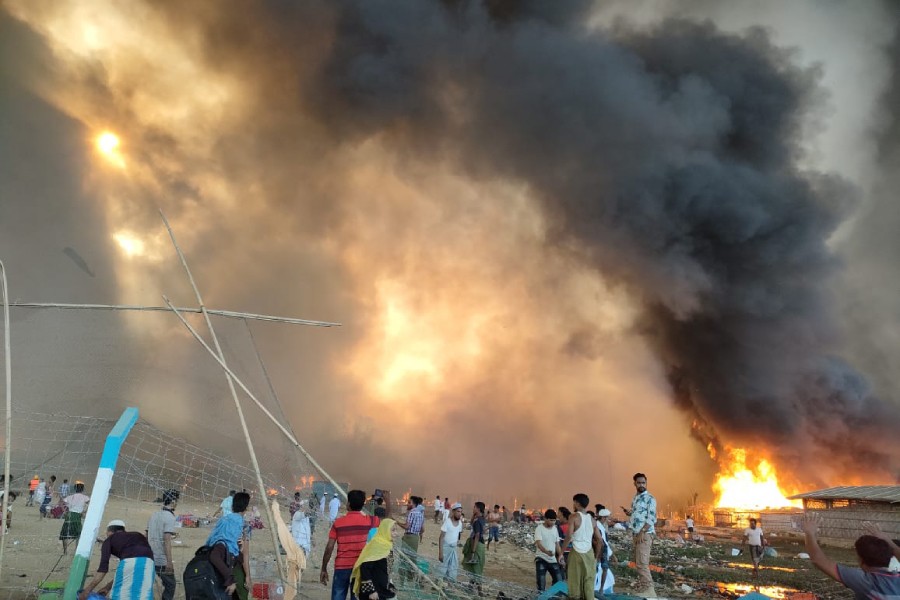The Human Rights Watch (HRW) urged Bangladesh to immediately remove the fencing around the Rohingya refugee camps in Cox’s Bazar claiming that the fencing cost lives during the massive fire incident.
It also called for proper investigation into the incident.
“Barbed wire fencing trapped thousands of refugees while a massive fire spread through Rohingya refugee camps in Bangladesh on March 22, 2021. The Bangladesh government should immediately remove the fencing surrounding the camps in Cox’s Bazar and promptly issue the results of its investigation into the deadly fire,” the rights watchdog said in a statement on Thursday.
At least 15 people, including 6 children, were killed in the fire, and over 50,000 people were displaced, it said.
However, with nearly 400 people reported missing, the actual number of fatalities is still unknown. Hundreds were injured, some while trying to escape the blaze by climbing over or cutting through barbed wire fencing.
“Refugees have horrifying accounts of being trapped inside barbed wire fencing as the fire swept through the Rohingya refugee camps,” said Brad Adams, Asia director at Human Rights Watch. “The authorities should immediately take down all fencing around the camps and make public the outcome of its investigation into the fire’s cause.”
Human Rights Watch interviewed 17 witnesses and refugees who lost family members during the fire who said that they were unable to quickly escape because of the barbed wire fencing that authorities built around the camps.
Human Rights Watch analysed satellite imagery collected after the fire in Kutupalong Refugee Camp on March 22, 2021.
The blaze erupted in camp 8W and rapidly spread to three adjacent camps – 8E, 9, and 10. Satellite imagery recorded on March 23 showed the destruction of roughly 61 hectares and at least 10,000 shelters in the camps.
It was the biggest fire in the camps since refugees fled to Bangladesh from arson attacks and other crimes against humanity by the Myanmar military in 2017. This was the third fire in the camps in just four days.
In 2019 the Bangladesh Parliamentary Standing Committee on Defense had recommended building a security fence around the camps “so that no one can come out of the camps and no one can enter inside the camps.”
Soon after, the authorities started fencing the camps. Rapid progress was made even during the months of severe restrictions on humanitarian access to contain the spread of Covid-19.
However, instead of making the refugees safe, the fencing denied them freedom of movement and placed them at serious risk when they needed to evacuate in an emergency or if they needed to obtain emergency medical and other humanitarian services, the statement said.
During the recent fires, the fencing in particular limited the ability of older people, children, and people with disabilities to flee. “People were frantically trying to escape the fire by climbing over or cutting through the barbed wire fence,” one refugee said.
“I saw some of them were injured by the barbed wire. Especially the children and older people were the most affected. With so many people trying to escape, it was often children and older people who got trapped.”
Bangladesh is a party to the International Covenant on Civil and Political Rights, which guarantees the right to freedom of movement, the statement continued.
Governments may restrict movement under certain circumstances, but such limits must be enacted in law, necessary to protect national security or public order, and be a proportionate response to a specific security concern, said HRW.
The fencing at the Cox’s Bazar refugee camps did not meet the international law standards of necessity and proportionality for restricting free movement. Restrictions on freedom of movement and other rights cannot be imposed on a discriminatory basis, including by nationality, it added.
“Bangladesh authorities are failing in their obligation to protect the lives of refugees by dangerously fencing them inside camps,” Adams said, adding, “The authorities should work with humanitarian agencies and remove the fences, and respect the refugees’ freedom of movement.”


